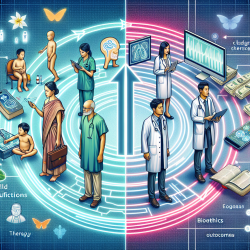In the realm of allied health and social care, the principles of Shared Decision Making (SDM) are paramount to ensuring effective, client-centered care. Recent research titled "SDM Training Modules for Health and Social Care Professionals in Israel" offers valuable insights into how practitioners can enhance their skills and better integrate SDM into their practice.
Understanding Shared Decision Making
Shared Decision Making (SDM) is a collaborative process that allows clients and professionals to make health and social care decisions together. This approach respects the expertise and preferences of both parties, leading to more personalized and effective care outcomes. While SDM has been widely adopted in medical fields, its implementation in allied health and social care is still evolving.
Key Findings from the Research
The research conducted in Israel focused on training modules designed to introduce SDM to students in allied health and social care professions. The study revealed several critical points:
- Students recognized the importance of SDM but lacked practical tools to implement it.
- Barriers to SDM included organizational structures and cultural contexts that were not supportive of this approach.
- Despite these challenges, students found that SDM could be implemented across various user populations and settings.
Practical Steps for Implementing SDM
For practitioners looking to improve their SDM skills, the following steps are recommended based on the research findings:
- Enhance Training: Incorporate SDM training modules into professional education curricula to bridge the gap between theoretical knowledge and practical application.
- Address Organizational Barriers: Advocate for organizational changes that support SDM, such as flexible reporting procedures and time allowances for client engagement.
- Foster a Supportive Culture: Promote a cultural shift within organizations to value experiential knowledge and encourage genuine partnerships with clients.
- Utilize Decision Aids: Implement decision aids to facilitate structured conversations and enhance client participation in the decision-making process.
Encouraging Further Research
While this pilot study provides a foundation for integrating SDM into allied health and social care, further research is needed to refine training methods and address barriers. Practitioners are encouraged to explore additional studies and contribute to the growing body of evidence supporting SDM.
To read the original research paper, please follow this link: SDM Training Modules for Health and Social Care Professionals in Israel.










